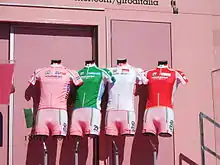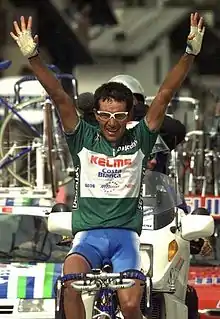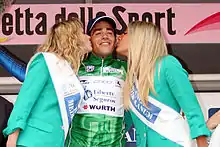Mountains classification in the Giro d'Italia
The Mountains classification in the Giro d'Italia is a secondary classification that is a part of the Giro d'Italia, one of cycling's Grand Tour races. In this classification, points are awarded to the leading riders over designated climbs. The climbs are put into different classifications based on difficulty and their position on that day's stage. Bonus points are given to mountain top finishes and to the first riders over the Cima Coppi, traditionally adjudged as the highest point of the entire Giro.
.jpg.webp) Giulio Ciccone in the blue jersey of classification leader during the 2019 Giro d'Italia | |
| Sport | Road Cycling |
|---|---|
| Competition | Giro d'Italia |
| Awarded for | Best climber in mountain stages |
| Local name | Gran Premio della Montagna (Italian) |
| History | |
| First award | 1933 |
| Editions | 86 (as of 2023) |
| First winner | |
| Most wins | (7 wins) |
| Most recent | |
The classification was first calculated in 1933; from 1974 to 2011, the leader of the mountains classification in the Giro d'Italia wore the maglia verde (from Italian: "green jersey"): in 2012, as part of a sponsorship deal, the jersey color was changed to blue (maglia azzurra).
History

The mountains classification was added to the Giro d'Italia in 1933.[1] In the inaugural year of the classification, the organizers chose select climbs and awarded points to the first three riders who crossed the climbs.[1] Alfredo Binda was first over each climb and won the first mountains classification.[1] In 1974, the organizers added a green jersey to designate the leader of the classification.[2] The green jersey was used until 2012, when the classification's sponsor, Banca Mediolanum, renewed its sponsorship for another four years and desired the jersey to be blue rather than green.[3]
Winners


| * | Winner won general classification in the same year |
| ‡ | Winner won general and points classification in the same year |
- The "Year" column refers to the year the competition was held, and wikilinks to the article about that edition of the race.
- The "Points" column refers to the number of points that the rider had in the mountains classification.
- The "Margin" column refers to the margin of time or points by which the winner defeated the runner-up.
- The "Stage wins" column refers to the number of stages wins the winner had during the race.
Multiple winners
As of 2023, 15 cyclists have won the mountains classification more than once.[7]
| Cyclist | Total | Years |
|---|---|---|
| 7 | 1935, 1936, 1937, 1939, 1940, 1946, 1947 | |
| 4 | 1971, 1972, 1973, 1974 | |
| 3 | 1948, 1949, 1954 | |
| 3 | 1964, 1965, 1966 | |
| 3 | 1979, 1980, 1981 | |
| 3 | 1990, 1992, 1993 | |
| 2 | 1952, 1957 | |
| 2 | 1956, 1959 | |
| 2 | 1961, 1963 | |
| 2 | 1975, 1976 | |
| 2 | 1982, 1983 | |
| 2 | 1995, 1996 | |
| 2 | 1997, 1999 | |
| 2 | 2001, 2003 | |
| 2 | 2009, 2011 |
By nationality
Riders from fifteen different countries have won the Mountains classification in the Giro d'Italia.[7]
| Country | No. of winning cyclists | No. of wins |
|---|---|---|
| 22 | 39 | |
| 12 | 16 | |
| 5 | 6 | |
| 5 | 6 | |
| 4 | 6 | |
| 3 | 3 | |
| 2 | 2 | |
| 1 | 2 | |
| 1 | 1 | |
| 1 | 1 | |
| 1 | 1 | |
| 1 | 1 | |
| 1 | 1 | |
| 1 | 1 | |
| 1 | 1 | |
Distribution of points
The points that are gained by consecutive riders reaching a mountain top are distributed according to 5 categories:
| Tipologia | 1st | 2nd | 3rd | 4th | 5th | 6th | 7th | 8th | 9th | |
|---|---|---|---|---|---|---|---|---|---|---|
| Cima Coppi | 50 | 30 | 20 | 14 | 10 | 6 | 4 | 2 | 1 | |
| First Category | 40 | 18 | 12 | 9 | 6 | 4 | 2 | 1 | - | |
| Second Category | 18 | 8 | 6 | 4 | 2 | 1 | - | - | - | |
| Third Category | 9 | 4 | 2 | 1 | - | - | - | - | - | |
| Fourth Category | 3 | 2 | 1 | - | - | - | - | - | - | |
The organization of the race determines which mountains are included for the mountains classification and in which category they are. The points for the Cima Coppi are awarded once every Giro, for the summit at the highest altitude in that Giro.
References
- Footnotes
- The 1956 Giro d'Italia had two mountain competitions: the Trofeo Dolomiti and the Trofeo Appennini. Charly Gaul won the former and Federico Bahamontes, the latter.
- Citations
- Bill and Carol McGann. "1933 Giro d'Italia". Bike Race Info. Dog Ear Publishing. Archived from the original on 2014-02-27. Retrieved 2012-07-10.
- Bill and Carol McGann. "1974 Giro d'Italia". Bike Race Info. Dog Ear Publishing. Archived from the original on 2017-07-25. Retrieved 2012-07-10.
- "Blue Mountains Jersey For 2012 Giro D'Italia". Cycling News. 17 December 2011. Retrieved 20 June 2013.
- "Past winners". Cyclingnews.com. 9 May 2009. Retrieved April 24, 2014.
- "Giro d'Italia – Fight for Pink: Il Garibaldi" (PDF). Giro d'Italia. RCS MediaGroup. p. 38. Archived from the original (PDF) on April 19, 2014. Retrieved 18 April 2014.
- Oliva, king of the mountain. "Galdós ganó la última etapa, pero no pudo ganar el Giro de Italia". hemeroteca.abc.es (in Spanish). 8 June 1975. Retrieved 4 June 2017.
- "Giro d'Italia 2009" (PDF). Infostrada sports. 2009. p. 187. Archived from the original (PDF) on 17 December 2010. Retrieved 29 June 2011.